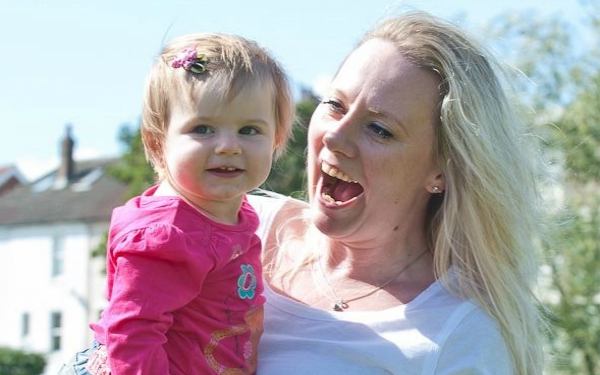
By Jenny Molloy
As a child of chronically addicted parents, one of them mentally ill, I needed resolution when I was scared, resolution which contained my fear and gave me sanctuary from this world which I perceived as a scary place. When this isn’t given by your primary care giver or, even worse, when sometimes it’s given and sometimes it isn’t, your anxiety is driven through the roof.
This can be the reality of day-to-day life with parents who are addicts. It’s confusing and frightening. Addicts’ first concern is usually their drug of choice and associated behaviors if they don’t achieve this goal can often be neglectful and violent. As a child living within this, you never know when to turn left or right, where your comfort will come from and where is the safest place to go.
Consequences for adult life
I often wonder now, as I fight chronic illness, what could have been done by my social workers, children’s home staff, foster carers or teachers to ward off physical consequences in adult life. I often wonder whether my childhood was assessed while I was in care as a lifetime course of trauma recovery – a timeline that looked at what my chances of success might be, mentally, physically and professionally, as an adult living in a world alone and without family support. The answer to both of these is complex.
Acknowledging what my brothers and I had experienced as children would have been huge. Our life at home felt like a bag of shameful secrets which no-one wanted to open.
I was offered therapy at the Tavistock Clinic. After school and I was to make my own way there by bus. I think of my own beautiful children and ask myself, if they had suffered such mental pain and physical hurt, would I not have considered the impact on their day in class knowing that they were being told to open up some of their most intimate memories? Further, would I not have wanted to be there to comfort them on the journey?
After acknowledging I needed security, don’t send me to therapy and then tell me you are moving me. Don’t take me to a public place to give me uncomfortable news. Place me in your mind as you would a child in your family, and keep me there, for as long as it takes.
Give us your mobile numbers
Text me to remind me that I have character assets, tell me that you thought of me that day, ask me to take care. That’s if we are privileged enough to have your mobile number, of course. I am tired of trying to work out why children in care do not have their social workers’ work mobile number. Really tired.
I want to say – well, shout and some days scream – “who do you think you are, not giving them your number, worried that they may call you a lot, taking up precious time that you haven’t got? Dare I say, they may even need you”. I’m tempted to say, “the question isn’t why haven’t they got all contact details for you”, and ask, “why do you have the honour of being our social workers?”.
A challenge I am putting out today to all social work managers is to find out whether all of your looked-after children have their social workers’ mobile number and whether those social workers text and call their looked-after children.
If not, consider whether these children are just “looked-after children” rather than children “who are looked after”. It changes the bar, doesn’t it?
You need to look after us in order for us to be able to look after ourselves, and this will come with enough spiritual and soulful care and love, and will certainly hinder our recovery if it doesn’t.
Share children’s grief
I speak from experience of not only my own childhood trauma but also as the grandparent to my Lily Rose, who sadly lost her daddy last year. The loss was brutal and sudden. The aftermath was devastating. We made mistakes, the first telling Lily Rose that her daddy had gone to live with the angels in the sky. After seeking advice, through the desperation of our grief, we corrected that with the truth, that daddy had died and that we believe his spirit will be with Lily Rose forever. The recovery is ongoing, but we listen and build our strategies around Lily’s loss as a live recovery.
Sharing and holding children’s grief and trauma is painful but we have to get better at supporting children through this who are received into care.
Recovery from childhood trauma is a lifetime journey which is much like a rollercoaster. A rollercoaster which not only has twists and turns, but occasionally breaks down, and even more occasionally is subject to an accident. All of these can be part of our adult lives having experienced childhood trauma.
Flashbacks to childhood trauma
As an adult, my trauma bites at me when not expected. Teaching with Frontline this summer I became caught in a flashback during a presentation. I was lost, could hear myself talking but couldn’t stop; I wouldn’t have chosen to share this deeply intimate traumatic experience, but shared it I did. It left me with shame so deep it actually hurts my heart. My heart feels sore, like it’s been bashed.
Thankfully it happened with Frontline where I was totally supported and understood. The team saw my pain and used their expert skills to bring me back into this world and back to my world. I guess I was “lucky” that it happened with such amazing social workers, but would these flashbacks have been less had I received this kindness and time when I was in care?
The ultimate humanistic approach has to be that social workers’ vision for looked-after children as adults (always keep your vision far ahead) would be where we would understand our place in this world, be grounded in our approach to life, be able to contain our emotional resilience and be attracted to the good and not the bad.
Jenny Molloy is a care leaver, patron of BASW England and the author of Hackney Child, Tainted Love and Neglected.






 Assistive technology and dementia: practice tips
Assistive technology and dementia: practice tips  A trauma-informed approach to social work: practice tips
A trauma-informed approach to social work: practice tips 




 Find out how to develop your emotional resilience with our free downloadable guide
Find out how to develop your emotional resilience with our free downloadable guide  Develop your social work career with Community Care’s Careers and Training Guide
Develop your social work career with Community Care’s Careers and Training Guide  ‘Dear Sajid Javid: please end the inappropriate detention of autistic people and those with learning disabilities’
‘Dear Sajid Javid: please end the inappropriate detention of autistic people and those with learning disabilities’ Ofsted calls for power to scrutinise children’s home groups
Ofsted calls for power to scrutinise children’s home groups Seven in eight commissioners paying below ‘minimum rate for home care’
Seven in eight commissioners paying below ‘minimum rate for home care’
 Facebook
Facebook X
X LinkedIn
LinkedIn Instagram
Instagram
Hi Jenny
Thanks for sharing your story, I can really relate to it. My parents were also addicts and we were neglected and abused. Worse still when we were taken or rather abducted into care, I was sexually abused by their son, I was 7 years old. I never actually saw a social worker at all during our time in care or since. Nothing was done about the abuse and we were eventually returned home to more abuse and neglect. I was never offered any support even when at the age of 15 I was thrown out by my parents, the response by a social worker was to tell me to return home, to more abuse, Needless to say I didn’t take her advice.
I’ve been in and out of Primary care most of my adult life and often wonder if things would have been different if I’d had some positive input from anyone. I couldn’t agree more about giving children in care contact details, it’s the least they should be doing to safeguard those children at a very vulnerable stage of their lives.
Just my thoughts on the mobile number issue, while I do understand the idea And I think there is a greater use of them my fear is what happens if that worker is on holiday or off sick? That vulnerable person has asked for help, left a text or message and no one gets back to them. What does that say to the person because I switch my phone off at the end of the day. They don’t go through a central system where they are picked up by someone else just in case.
I would have concerns about handing out my work mobile number to everyone.
As an adult services worker who often deals with adults who have been through the cared for system who cannot cope I think we need to look at ways of addressing these deep psychological needs I would like there to be greater focus on this. I don’t think giving mobiles is enough though to cover this gap. The social work role seems to be less about direct support than assessing risk and completing reports.